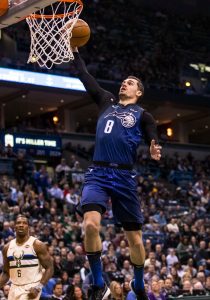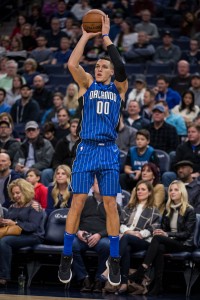Still, the roster remained caught between two eras, with long-term deals for the likes of Bismack Biyombo and Nikola Vucevic still on the team’s books, and Aaron Gordon – perhaps Rob Hennigan‘s most successful lottery pick in Orlando – eligible for restricted free agency.
While Weltman and Hammond have focused on drafting the best players available that fit their vision for the franchise, those players have overlapped in terms of position with many of the Magic’s highest-paid veterans, creating a logjam in the frontcourt and an odd mix of players on the team’s depth chart.
At some point, the Magic will have to address the roster imbalance, but for now, the club remains focused on compiling as much talent as possible and identifying the long-term keepers from that group. Unlike Hennigan, who went all-in when he acquired Biyombo and Serge Ibaka in 2016, the new Magic decision-makers don’t yet feel any pressure to push for a playoff spot, and the team’s offseason moves reflected their patience.
Key offseason losses:
Veterans like Arron Afflalo, Shelvin Mack, and Marreese Speights were decent stop-gap options to fill various roles in the Magic’s rotation, but none of those players were long-term solutions in Orlando, so it comes as no surprise that they moved on this offseason.
The most notable departure of the summer was Mario Hezonja, who was selected fifth overall in the 2015 draft by the Magic, but showed so little in his first two seasons that the team didn’t even exercise his fourth-year option for 2018/19. That may have been a mistake — Hezonja enjoyed his best year as a pro in 2017/18, averaging 9.6 PPG and 3.7 RPG with a .442/.337/.819 shooting line.
Those numbers don’t jump off the page, but Hezonja got better as the season went on (12.8 PPG on .433/.357/.838 shooting in his final 34 games) and he’s still just 23 years old. Keeping him for one more year at a fairly modest rate of $5.17MM, then holding the right of first refusal in restricted free agency in 2019, may have paid dividends for Orlando. As it was, the team was ineligible to offer him more than $5.17MM for 2018/19, and he received offers that exceeded that.
Biyombo is the other noteworthy loss for the Magic this summer, though the trade that sent him to Charlotte brought back a somewhat similar player (Timofey Mozgov) in terms of role and contract. That swap is unlikely to have much of an impact on Orlando’s rotation, given all the team’s other options up front.
Key offseason additions:
Jerian Grant could be a solid backup point guard for the Magic, and it’s possible the team will get a little more out of Jarell Martin than he showed in Memphis. Melvin Frazier and Justin Jackson are solid second-round prospects too, but none of those additions will transform the roster.
The one move that could be franchise-altering is the selection of Bamba with the sixth overall pick. The Magic probably didn’t need to add another center to an overcrowded frontcourt, but if he develops into the player he’s capable of becoming, Bamba will easily outlast Vucevic, Mozgov, Khem Birch, and anyone else that sees time at the five this season for Orlando.
At age 20, Bamba is still a pretty raw prospect, but the Magic can afford to be patient, and the youngster’s defensive upside is massive. Coming off a freshman season in which he averaged 10.9 RPG and 3.7 BPG at Texas, Bamba has earned comparisons to Rudy Gobert, a perennial NBA Defensive Player of the Year candidate. Evolving into a Gobert-like defensive anchor would be a tall order, but Bamba’s athleticism and rim-protecting ability make him an intriguing prospect in the modern NBA, especially since he’s more advanced offensively than Gobert and other defensive specialists were at his age.
Outside of drafting Bamba, the Magic secured another potential long-term piece of their frontcourt when they re-signed Gordon to a new four-year contract. It’ll be interesting to see whether the team genuinely views Gordon as a building block in Orlando. If Weltman and Hammond consider Isaac the power forward of the future, Gordon could eventually become a trade chip.
With only 27 NBA games under his belt though, Isaac hadn’t shown nearly enough to make Gordon expendable, so it makes sense that Orlando would retain a significant asset like Gordon in restricted free agency, rather than losing him for nothing. His long-term future with the Magic may hinge on Isaac’s development, or lack thereof.
Outlook for 2018/19:
Like the Hawks, the first team we profiled in our Offseason in Review series, the Magic finished near the bottom of the NBA standings in 2017/18 and seem like a good bet to do so again in 2018/19. Both clubs replaced their head of basketball operations in 2017 and their head coach in 2018 (Steve Clifford will be at the helm in Orlando), and appear content to rebuild gradually rather than rushing the process along.
For the Magic, that means waiting for those long-term contracts signed by the old regime to expire or to become useful trade chips, so that the new regime can shape the roster into the one it envisions.
During the coming season, we’ll likely hear plenty of trade whispers about veterans like Vucevic, Terrence Ross, and even Evan Fournier while prospects like Isaac, Bamba, and Wesley Iwundu get the chance to take on more significant roles.
Salary information from Basketball Insiders was used in the creation of this post. Photos courtesy of USA Today Sports Images.

